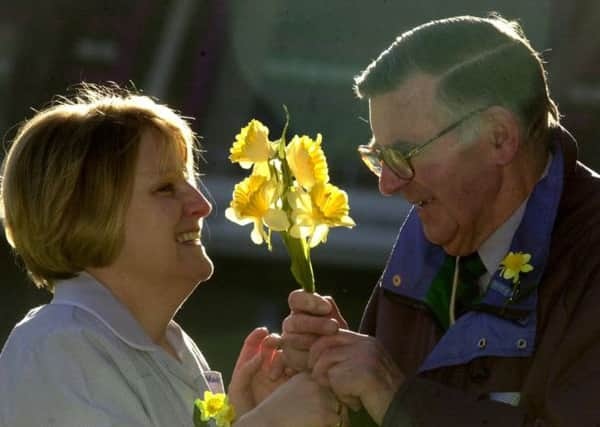Comment: Taking scares out of cancer care


However, amid the shock, I felt fortunate. I was a nurse who has specialised in cancer for most of my career and the words, terms and treatments discussed were all familiar to me. This knowledge fostered hope and enabled me to help my friend and those around her understand what was happening.
CONNECT WITH THE SCOTSMAN
• Subscribe to our daily newsletter (requires registration) and get the latest news, sport and business headlines delivered to your inbox every morning
Advertisement
Hide AdAdvertisement
Hide AdIn my professional capacity I am only too aware that the language of cancer can be complex and bewildering, with pathways of care equally variable. Individuals, families and friends seek knowledge and information from a variety of sources to make sense of their situation and support can appear in many guises. The increasing incidence of cancer, coupled with longer survival rates, means most nurses will care for, or meet a person with a cancer diagnosis in their daily work.
It is no longer a condition cared for by a few; instead it is seen in all healthcare and social environments. Nurses need to recognise the challenges this creates and the opportunities they have to influence prevention and recovery.
Cancer is not a single disease – it is many, each with their own unique characteristics. Let’s be clear, cancer does not define an individual; it is a diagnosis just like other conditions. The person is often referred to as “a cancer patient” but they are someone with families, friends, lives, hopes and aspirations.
As a nurse, I was in a unique and privileged position, meeting people at a difficult time in their lives and providing support. I recognised quickly that the more I understood about the disease and its treatments, the better equipped I would be to offer support.
One area that creates confusion and mis-information is chemotherapy. I have witnessed this personally and professionally.
All chemotherapy drugs are not the same. The term “chemotherapy” describes a range of drugs. It is important to know what drugs a person is taking so that specific information and advice can be given. Not all drugs cause hair loss and some have more side-effects than others.
Being able to provide specific information and advice can bring a great deal of reassurance to a patient. Although increasing numbers of people may be diagnosed with cancer, many treatments continue to be given in specialist units and by highly trained healthcare professionals.
In my view, taking chemotherapy and radiotherapy as examples, knowledge is also about having the wisdom to recognise when we don’t know something, avoiding unnecessary distress. I once read that people forget what one says, people forget what one does but people never forget how one made them feel.
Advertisement
Hide AdAdvertisement
Hide AdMy learning about cancer has been informed by three strands: an academic foundation, the application of learning into practice, and experiences gained from listening to people who have cancer. This learning is not linear, but cyclical and continuous. There are now so many opportunities to learn about cancer, with many nurses like myself keen to share our expertise, teach, debate and research in this area. Learning also comes from knowing about the communities in which we live and the important role the charitable sector plays in supporting people with cancer.
By offering a quiet space to reflect, speaking with someone independent of the clinical team and encouraging recovery through practical, emotional and social support, there are many ways people can reach out for help. Organisations such as Breast Cancer Care, Myeloma UK, Macmillan Cancer Support, Cancer Research UK and Maggie’s Centres complement the work of health professionals, but we cannot assume a person knows what they do. Many people recognise the names of cancer charities; it is only upon diagnosis that these are fully explored. The least we can do as nurses is to make sure we know what we and those around us are doing. It is up to the individual to choose the right option for them.
Learning about cancer is a dynamic process and forging closer links between higher education, cancer charities, NHS and social care is definitely the way forward, offering opportunities to foster collaboration and partnership and improve the experience of those who have cancer.
• Dr Susanne Cruickshank is a Reader in Cancer Nursing at Edinburgh Napier University. www.napier.ac.uk